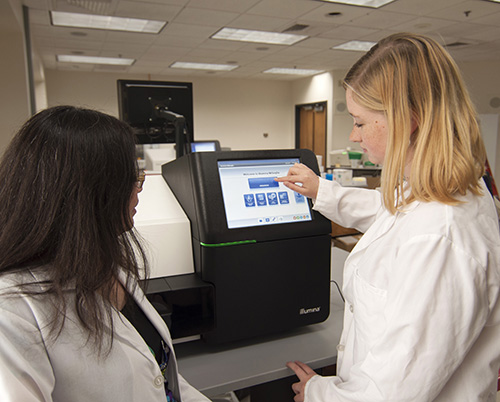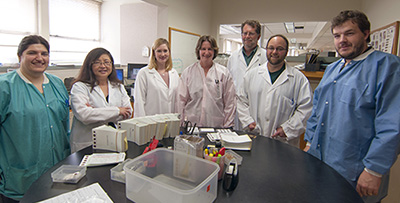Thanks to universal screening protocols, newborns in every state are routinely tested for cystic fibrosis (CF)—a life-threatening disease that occurs in 1 of every 4,000 births—through a simple blood test.
Most of the time, the screening results are negative. Due to technology limitations, however, each year approximately 150 CF screens in Wisconsin alone come back with a false positive result.
But with grant support from the Legacy of Angels Foundation (LOAF), Mei Baker, MD, and Phillip Farrell, MD, PhD, are using state-of the-art DNA sequencing technology to develop a new CF screening protocol that may substantially reduce the likelihood of false positives.
Identifying CF-Causing Gene Mutations
CF is an inherited disease caused by mutations in the CFTR gene. Nearly 2000 types of CFTR mutations exist, but only about 10 percent of them cause CF. Many more people “carry” a CF gene mutation than actually have the disease.
Most state CF screening programs use a two-tier algorithm that screens for immunoreactive trypsinogen (IRT) levels plus between 23 and 40 CFTR mutations. Under this algorithm, infants with one or two CFTR mutations are reported as screening positive.
Those infants must undergo further testing to confirm whether they truly have CF, resulting in often unnecessary extra costs and parental anxiety.
Recently, however, an international research project, Clinical and Functional Translation of CFTR (CFTR2) identified the 162 CFTR mutations responsible for 97 percent of CF cases.
At the same time, next-generation DNA sequencing technology is now able to simultaneously detect at least that number of mutations from a blood sample.
According to Dr. Baker, who also co-directs the newborn screening laboratory at the Wisconsin State Laboratory of Hygiene (WSLH), those two factors converge in the study she and Dr. Farrell are leading.

“Because of this grant, we are the first newborn screening lab in the nation to have a next-generation DNA sequencing instrument on site, so we can develop a three-tier CF screening protocol,” she explained.
Three-Tier Protocol Analyzes 162 Mutations
In the new protocol, blood specimens with one CFTR mutation will undergo additional analysis using the expanded panel of 162 mutations. Only newborns found to have two CFTR mutations will be reported as screening positive.
Dr. Baker said the research team has developed the new screening assay using stored dried blood spots from the WSLH, and is currently evaluating its performance.
Obtaining the quality and quantity of DNA needed from dried blood spots is technically challenging, Dr. Baker acknowledged, but preliminary results suggest it may be possible to reduce the false positive rate by up to 75 percent.

“Wisconsin has a long history of using applied DNA technology for newborn screening,” she said. “In addition to our work with CF, the WSLH was the first in the world to use DNA as the primary marker for identifying severe combined immunodeficiency. So we are very advanced in our capabilities.”
As the team fine-tunes the new protocol, the study is also expanding to include blood samples from newborn screening programs in Minnesota, Michigan, and Illinois. Those three states plus Wisconsin form the Great Lakes Consortium on CF Newborn Screening.
“Our data will be even more reliable when we have more samples, and Dr. Farrell is making that possible,” Dr. Baker said. “He is well known as a national and international advocate for CF screening, has been instrumental in forming the consortium, and has helped other states obtain institutional approval to participate in this study.”